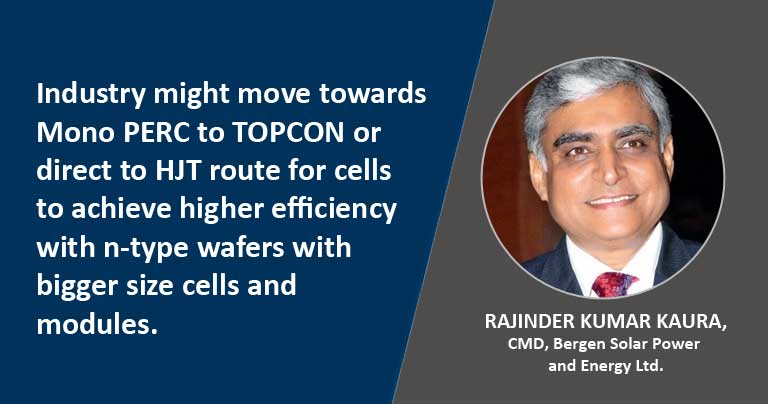Ongoing coal trend might reroute PV manufacturers to Hybrid systems
By EPR Magazine Editorial November 15, 2021 11:04 am IST
By EPR Magazine Editorial November 15, 2021 11:04 am IST

Discussing the changing trends in the Solar sector, Rajinder Kumar Kaura, CMD, Bergen Solar Power and Energy Ltd walks us through the key significant factors that will impact the growth prospects of Solar PV manufacturers in the coming years.
How are the present energy trends impacting the demand for solar PV Modules and mounting structures in India?
The V-curve revival of the economy after the Corona Pandemic is receding; there is a trend of higher consumption of energy compounded with the festival season. However, the EV market will increase demand at an unusual growth rate. Interestingly, the power demand is expected to augment in the coming 7 years, and will be almost double what it is today, at around 360GW after 75 years of independence will become 1000 GW plus in 2030. The size of wafers, cells from M0 to M12 sizes, half-cut cells and new sizes of modules coming on the market even beyond 600W have put new challenges on the structure.
New technologies like Topcon and HJT, offering bifacial modules require new mounting structures. The designers have to look into new designs to offer best output out of the panels. Also, most importantly, the conventional tilt angles need to be relooked and reconsidered, when reflecting surfaces are available.
How are PV manufacturers responding to India’s ever-increasing demand for reliable energy supply?
There is a buzz word about the expansion of PV manufacturing. Technology is changing; the supply chain specs are getting changed. Cells of larger sizes are available. P-type to n-type wafers, Multi to Mono Cells, Full size to half cut-cells all has put new challenges to PV manufacturers. As a result, changes to existing cell and module lines will be required. Mostly, module manufacturers are also getting into scaling up their capacities in the 500MW to 1GW capacity range.
For uninterrupted power supply, installations of solar PV need to have storage as a mandatory requirement. The coal shortage may make PV Manufacturers to go in for Hybrid systems. Even the bigger power plants with big capacities will have to be firmed up flow batteries or Hydrogen gas as storage media.
What are the opportunities and challenges for the Solar PV manufacturers especially in terms of cost and obtaining raw materials in India?Firstly consumables and raw materials need to be started manufactured in India. Flux, Silver Paste, EVA, glass, Junction Box, sealing paste, tabbing, screens etc. However to match the GW scale of new plants-supply chain must be encouraged for local manufacturing. PLI type schemes must be also introduced for supply chain items. The Challenge is the technology know-how and stopping dumping by China.
How are the government’s policies helping the industry to increase localisation and domestic manufacturing in this sector?
The PLI scheme for the complete supply chain, right from polysilicon to modules has attracted almost 4 bidders. The government must also ensure that new and latest technologies are encouraged where Opex and LCOE are reduced. Till the complete supply chain is not there, China will continue to arm-twist the Indian players in manufacturing, especially cell and module manufacturers.
What kind of technologically advanced solar modules do you offer for this sector?
Either the industry will go Mono PERC to TOPCON route for cells and try to achieve higher efficiency with n-type wafers with bigger size cells and modules. Or, the industry should go straight away with the HJT technology which will give more than 25 percent efficiency, and next phase to go in for Tandem Cells. India needs FROG JUMPING through technology to compete with China. Therefore, we see a bright future for HJT cells which will bring lower LCOE for Solar farms.
We use cookies to personalize your experience. By continuing to visit this website you agree to our Terms & Conditions, Privacy Policy and Cookie Policy.